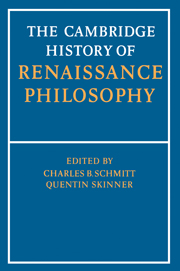Book contents
- Frontmatter
- Introduction
- PART 1 THE INTELLECTUAL CONTEXT
- PART 2 PHILOSOPHY AND ITS PARTS
- 6 Logic and language: Traditional logic
- 7 Logic and language: Humanistic logic
- 8 Natural philosophy: Traditional natural philosophy
- 9 Natural philosophy: The new Philosophy of nature
- 10 Natural philosophy: Astrology and magic
- 11 Moral philosophy
- 12 Political philosophy
- 13 Psychology: The concept of psychology
- 14 Psychology: The organic soul
- 15 Psychology: The intellective soul
- 16 Metaphysics
- 17 Problems of knowledge and action: Fate, fortune, providence and human freedom
- 18 Problems of knowledge and action: Theories of knowledge
- 19 Problems of knowledge and action: Epistemology of the sciences
- 20 Philosophy and humanistic disciplines: Rhetoric and poetics
- 21 Philosophy and humanistic disciplines: The theory of history
- PART 3 SUPPLEMENTARY MATERIAL
- Biobibliographies
- Bibliography
- Index nominun
- Index rerum
- References
16 - Metaphysics
from PART 2 - PHILOSOPHY AND ITS PARTS
Published online by Cambridge University Press: 28 March 2008
- Frontmatter
- Introduction
- PART 1 THE INTELLECTUAL CONTEXT
- PART 2 PHILOSOPHY AND ITS PARTS
- 6 Logic and language: Traditional logic
- 7 Logic and language: Humanistic logic
- 8 Natural philosophy: Traditional natural philosophy
- 9 Natural philosophy: The new Philosophy of nature
- 10 Natural philosophy: Astrology and magic
- 11 Moral philosophy
- 12 Political philosophy
- 13 Psychology: The concept of psychology
- 14 Psychology: The organic soul
- 15 Psychology: The intellective soul
- 16 Metaphysics
- 17 Problems of knowledge and action: Fate, fortune, providence and human freedom
- 18 Problems of knowledge and action: Theories of knowledge
- 19 Problems of knowledge and action: Epistemology of the sciences
- 20 Philosophy and humanistic disciplines: Rhetoric and poetics
- 21 Philosophy and humanistic disciplines: The theory of history
- PART 3 SUPPLEMENTARY MATERIAL
- Biobibliographies
- Bibliography
- Index nominun
- Index rerum
- References
Summary
The subject-matter of metaphysics has been debated since the time when Aristotle first conceived the idea of the science. He himself speaks of ‘the science we are seeking’ and describes it differently in different places. In Metaphysics IV.I (1003a 21–6) he speaks of a science which studies being as being and contrasts this science with the special sciences, like the mathematical disciplines, which investigate the attributes of a part of being. Two chapters later, IV.3 (1005b), Aristotle speaks of a science which he calls ‘first philosophy’ because it grounds the first principles or axioms of the special sciences. But in book VI.I (1026a 18–19) he distinguishes three types of speculative science, physics, mathematics and ‘divine science’, so that one must ask how he understood the relationship between the general science of being, first philosophy and divine science. It is clear that divine science studies objects that are separate from matter and not subject to change. But Aristotle seems to have wanted to identify this science both with the investigation of being and with the science of the principles of the sciences, on the ground that divine science concerns itself with the highest principle of being in general and can for this reason preside over the special sciences. At the same time, each of these definitions of metaphysics must be understood in accordance with Aristotle's own idea of what science is. In his conception, scientific knowledge is attained by way of the definition of the essential natures of things and the demonstration of the attributes which necessarily belong to them. Basically, Aristotle understood reality as an ordered structure.
- Type
- Chapter
- Information
- The Cambridge History of Renaissance Philosophy , pp. 535 - 638Publisher: Cambridge University PressPrint publication year: 1988
References
- 12
- Cited by

